Annual Applied Complexity Network and Board of Trustees Symposium: Invention and Innovation Speakers: Difference between revisions
From Santa Fe Institute Events Wiki
No edit summary |
No edit summary |
||
| (2 intermediate revisions by 2 users not shown) | |||
| Line 1: | Line 1: | ||
{|bord''Italic text''er="0" style="margin: 0px 0px 0px 10px; background: #f9f9f9; border: solid #aaa 1px;" | {|bord''Italic text''er="0" style="margin: 0px 0px 0px 10px; background: #f9f9f9; border: solid #aaa 1px;" | ||
| | | | ||
*[[Annual_Applied_Complexity_Network_and_Board_of_Trustees_Symposium: | *[[Annual_Applied_Complexity_Network_and_Board_of_Trustees_Symposium:_The_Emerging_Frontiers_of_Invention|Home]] | ||
*[[Annual_Applied_Complexity_Network_and_Board_of_Trustees_Symposium: | *[[Annual_Applied_Complexity_Network_and_Board_of_Trustees_Symposium:_The_Emerging_Frontiers_of_Invention_Agenda|Agenda]] | ||
*[[Annual_Applied_Complexity_Network_and_Board_of_Trustees_Symposium: | *[[Annual_Applied_Complexity_Network_and_Board_of_Trustees_Symposium:_The_Emerging_Frontiers_of_Invention_Speakers|Speakers]] | ||
*[[Annual_Applied_Complexity_Network_and_Board_of_Trustees_Symposium: | *[[Annual_Applied_Complexity_Network_and_Board_of_Trustees_Symposium:_The_Emerging_Frontiers_of_Invention_Registration|Registration]] | ||
*[[Annual_Applied_Complexity_Network_and_Board_of_Trustees_Symposium: | *[[Annual_Applied_Complexity_Network_and_Board_of_Trustees_Symposium:_The_Emerging_Frontiers_of_Invention_Travel|Travel Information]] | ||
|} | |} | ||
<br> | <br> | ||
[[Image:Invention inno.jpg| | [[Image:Invention inno.jpg|400px|{border}]] <br> | ||
'''November 9-10, 2018<br />''' | '''November 9-10, 2018<br />''' | ||
Santa Fe Institute | Santa Fe Institute | ||
<br /> | |||
<br /> | |||
==<span style="color:#d15a2a">Panelists & Moderators Include:</span>== | |||
[[File:david-ackley.jpg|thumb|200px|[https://www.cs.unm.edu/~ackley '''Dave Ackley''']<br />'''UNM''']] | |||
'''Dave Ackley''' is currently an emeritus associate professor of Computer Science at the University of New Mexico, and was previously an External Faculty member at the Santa Fe Institute. Dr. Ackley explores living computation – the principle that living systems and computational systems are ultimately the same things. His research has contributed to neural networks and machine learning, evolutionary algorithms and artificial life, and biological approaches to security, architecture, and models of computation. He is developing robust-first computing on indefinitely scalable computer architectures, moving beyond deterministic execution to expand computational power and achieve a credible basis for computer security. | |||
Dr. Ackley earned his BS in Applied Mathematics from Tufts University, and his MS and PhD in Computer Science from Carnegie Mellon University. | |||
<div style="clear: both;"></div> | |||
<hr /> | |||
[[File:SeamusBlackley.jpg|thumb|200px|[https://www.pacificlightandhologram.com/ '''Seamus Blackley''']<br />'''Pacific Light & Hologram''']] | |||
'''Seamus Blackley''', widely known as the “father of the Xbox,” is a high energy physicist and game designer who is currently CEO of venture-backed startup Pacific Light & Hologram. | |||
<div style="clear: both;"></div> | |||
<hr /> | |||
[[File:TristanDuke1.jpg|thumb|200px|[https://www.infinitylightscience.com/about/ '''Tristan Duke''']<br />'''Infinity Light Science''']] | |||
'''Tristan Duke''' is an artist with a background in photography and holography. With a deep interest in the science of optics and visual perception, Tristan seeks to invent new forms of visual representation. His work has been exhibited internationally including: Art Villa Garikula, Georgia; The Velaslavasay Panorama, Los Angeles; MASS MoCA, North Adams; and Holocenter, Long Island, NY. Since 2008 he has been pioneering the development of hand-drawn holography as a creative medium. In 2014, he invented a new holographic technology to create the first ever hand-drawn holographic record for Jack White’s album Lazaretto. He has gone on to create hologram artwork for many records including the Star Wars: The Force Awakens sound track (2016). | |||
He is a founding member (along with Lauren Bon and Richard Nielsen) of the Optics Division of the Metabolic Studio. With the Optics Division, exhibitions include: DePaul Art Museum, Chicago, IL; Los Angeles Contemporary Exhibitions (LACE); the Hammer Museum, Los Angeles; Les Rencontres d'Arles, France; The George Eastman House, Rochester, NY; and the Smithsonian Hirshhorn, Washington DC. | |||
Tristan moved his studio, Infinity Light Science, to Los Angeles in 2010. He is a fellow at the Museum of Jurassic Technology. | |||
<div style="clear: both;"></div> | |||
<hr /> | |||
[[File:Stephanie-Forrest.jpg|thumb|200px|[https://www.cs.unm.edu/~forrest/ '''Stephanie Forrest''']<br />'''UNM & SFI''']] | |||
'''Stephanie Forrest''' is Regents Distinguished Professor of Computer Science at the University of New Mexico in Albuquerque. Professor Forrest received the Ph.D. in Computer and Communication Sciences from the University of Michigan. Before joining UNM she worked for Teknowledge Inc. and was a Director's Fellow at the Center for Nonlinear Studies, Los Alamos National Laboratory. Professor Forrest is currently a member of the External Faculty at the Santa Fe Institute, and served as Co-chair of its Science Board (2010-2013) and as Interim Vice President (1999-2000). She spent 2013-2014 as a Jefferson Science Fellow at the U.S. Dept. of State and is currently a board member of the Computing Research Association. | |||
Professor Forrest directs the Adaptive Computation Laboratory at UNM, where she studies adaptive systems, including genetic algorithms, computational immunology, biological modeling, automated software repair, and computer security. She is also a member of the Program in Interdisciplinary Biological & Biomedical Science (PIBBS) and the Center for Evolutionary and Theoretical Immunology (CETI). | |||
<div style="clear: both;"></div> | |||
<hr /> | |||
[[File:alan-gershenfeld2.jpg|thumb|200px|[https://www.elinemedia.com/team_member/alan-gershenfeld '''Alan Gershenfeld''']<br />'''E-Line Media''']] | |||
'''Alan Gershenfeld''' has spent the last twenty years at the intersection of entertainment, technology and social entrepreneurship. He is currently President and Co-Founder of E-Line Media, a developer and publisher of games that help players understand and shape the world. Alan has worked on impact game projects with the Gates Foundation, MacArthur Foundation, NSF, USAID, DARPA, White House OSTP, California Endowment, Cook Inlet Tribal Council, Games for Change, Google, Sesame Workshop, MIT Center for Bits and Atoms and the ASU Center for Games and Impact. | |||
Prior to E-Line, Alan was CEO and Co-Founder of netomat, a developer of mobile-web community solutions. Before netomat, Alan was a member of the executive management team that rebuilt Activision from bankruptcy into an industry leader. At Activision, Alan supervised all product development at the company's LA studios. Titles released under his leadership include Civilization: Call to Power, Muppet Treasure Island, Mechwarrior 2, Asteroids 3D, Spycraft, Shanghai, Pitfall, Zork and Tony Hawk Skateboarding. | |||
Before Activision, Alan worked in the film industry where he worked in development, production and post-production on numerous feature films and documentaries. As a writer, Alan was a film critic for the South China Morning Post in Hong Kong and has published articles on video games and social impact in Scientific American, Education Week, Huffington Post, Slate and Knowledge Quest. Most recently Alan co-authored, with his two brothers, Designing Reality: How to Survive and Thrive in the 3rd Digital Revolution. | |||
As a speaker, Alan has been a featured at a wide variety of conferences throughout the world including SXSW, Sundance Film Festival, Game Developers Conference, SOCAP, DICE, Milia/Cannes, AAAS, National Academies and the World Economic Forum at Davos, Switzerland and Dalian, China. Alan currently serves on the Board of FilmAid International and Advisory Boards for PBS Kids New Media, iCivics and the Joan Ganz Cooney Center For Educational Media and Research (Sesame Workshop). He is also on the Advisory Board and former Chairman of Games for Change. | |||
<div style="clear: both;"></div> | |||
<hr /> | |||
[[File:AaronHorowitz.jpg|thumb|200px|[https://www.sproutel.com/ '''Aaron Horowitz''']<br />'''Sproutel''']] | |||
'''Aaron Horowitz''' is the co-founder and CEO of Sproutel, which is a patient-centered R&D workshop focused on creating technology at the intersection of patient and market needs. Previous to Sproutel, Aaron was a National Board Advisor at Design for America. Aaron received a BS in Mechanical Engineering from Rice University, and a BS in Mechatronics and User Interaction Design from Northwestern University. | |||
<div style="clear: both;"></div> | |||
<hr /> | |||
[[File:alan-kay-2.jpg|thumb|200px|[https://en.wikipedia.org/wiki/Alan_Kay '''Alan Kay''']<br />'''Viewpoints Research Institute & UCLA''']] | |||
'''Alan Kay''' was born in Springfield, Massachusetts, in 1940. He received a B.S. in mathematics and molecular biology from the University of Colorado at Boulder (1966) and an M.S. (1968) and Ph.D. (1969) from the University of Utah in Computer Science. | |||
Kay is best known for the idea of personal computing, the concept of the laptop computer, and the inventions of the now ubiquitous overlapping-window interface and modern object-oriented programming. | |||
His deep interest in children was the catalyst for these ideas, and it continues to inspire him. Kay was one of the founders of the Xerox Palo Alto Research Center (PARC), in Palo Alto, California, where he led one of the groups that developed ideas into modern workstations (and the forerunner of the Macintosh), the Smalltalk computer language, the overlapping-window interface, desktop publishing, the Ethernet, laser printing, and network "client servers." His "Dynabook" concept prefigured the modern laptop computer by several decades. | |||
Kay has received many awards, including ACM's Software Systems Award and the J-D Warnier Prix d'Informatique. He is a Fellow of the American Academy of Arts and Sciences, the National Academy of Engineering, and the Royal Society of Arts. He has won the ACM Turing Award (2003) and the Kyoto Prize (2004). | |||
<div style="clear: both;"></div> | |||
<hr /> | |||
[[File:davidkrakauer2.jpg|thumb|200px|[https://www.santafe.edu/people/profile/david-krakauer '''David Krakauer''']<br />'''Santa Fe Institute''']] | |||
'''David Krakauer's''' research explores the evolution of intelligence on earth. This includes studying the evolution of genetic, neural, linguistic, social and cultural mechanisms supporting memory and information processing, and exploring their shared properties. He served as the founding Director of the Wisconsin Institute for Discovery, the Co-Director of the Center for Complexity and Collective Computation, and Professor of mathematical genetics all at the University of Wisconsin, Madison. David has been a visiting fellow at the Genomics Frontiers Institute at the University of Pennsylvania, a Sage Fellow at the Sage Center for the Study of the Mind at the University of Santa Barbara, a long-term Fellow of the Institute for Advanced Study in Princeton, and visiting Professor of Evolution at Princeton University. In 2012 Dr. Krakauer was included in the Wired Magazine Smart List as one of 50 people "who will change the World.” In 2016 Krakauer was included in Entrepreneur Magazine’s visionary Leaders advancing global research and business. | |||
<div style="clear: both;"></div> | |||
<hr /> | |||
[[File:ConstanceSteinkuehler.jpg|thumb|200px|[https://www.informatics.uci.edu/explore/faculty-profiles/contance-steinkuehler/ '''Constance Steinkuehler''']<br />'''UC Irvine''']] | |||
'''Constance Steinkuehler''' is a Professor of Informatics at the University of California, Irvine where she researches the cognitive and social aspects of esports and multiplayer online videogames. Constance currently chairs the Annual Esports Conference at UCI and the UCI Esports Program Task Force for Diversity and Inclusion. She is the founder and former President of the Higher Education Video Games Alliance and formerly served as Senior Policy Analyst, advising on games and digital media, under the Obama administration in the White House Office of Science and Technology Policy. | |||
<div style="clear: both;"></div> | |||
<hr /> | |||
[[File:jsb.jpg|thumb|200px|[https://www.johnseelybrown.com/ '''John Seely Brown''']<br />'''Deloitte Center for the Edge & USC''']] | |||
'''John Seely Brown''' or as he is often called—JSB—is the Independent Co-Chairman of the Deloitte’s Center for the Edge and a visiting scholar and advisor to the Provost at University of Southern California (USC). A master integrator and instigator of productive friction, JSB explores the whitespace between disciplines and builds bridges between disparate organizations and ideas. | |||
Prior to that he was the Chief Scientist of Xerox Corporation and the director of its Palo Alto Research Center (PARC)—a position he held until June 2000. In his more than two decades at PARC, Brown transformed the organization into a truly multidisciplinary research center at the creative edge of applied technology and design, integrating social sciences and arts into the traditional physics and computer science research and expanding the role of corporate research to include topics such as the management of radical innovation, organizational learning, complex adaptive systems, and nano-technologies. He was a cofounder of the Institute for Research on Learning (IRL). His personal research interests include digital youth culture, digital media, and the application of technology to fundamentally rethink the nature of work and institutional architectures in order to enable deep learning across organizational boundaries – in brief, to design for emergence in a constantly changing world.
JSB is a member of the American Academy of Arts and Sciences, the National Academy of Education, a Fellow of the American Association for Artificial Intelligence and of AAAS and a Trustee of the MacArthur Foundation. He serves on numerous private and public boards of directors, including Amazon, and has been a trustee for nonprofits including the MacArthur Foundation and In-Q-tel. In addition to publishing over 100 papers in scientific journals, JSB has authored numerous articles and reports spanning business strategy and management issues. He was awarded the Harvard Business Review's 1991 McKinsey Award for his article "Research that Reinvents the Corporation" and again in 2002 for his article (with John Hagel) "Your Next IT Strategy." In 1997 he edited the book Seeing Differently: Insights on Innovation (Harvard Business Review Books, 1997) about how new organizational structures, technologies, and global perspectives could change the way innovation occurs. He co-authored (with Paul Duguid) the acclaimed book The Social Life of Information (HBS Press, 2000), which has been translated into 10 languages with a second edition in April 2002. With John Hagel, he co-authored the books The Only Sustainable Edge about new forms of collaborative innovation and The Power of Pull: how small moves, smartly made can set big things in motion, published April 2010. His most recently published book, The New Culture of Learning, co-authored with Doug Thomas at the University of Southern California, was released January 2011. He is currently working on a new book, co-authored with Ann Pendleton-Jullian at Georgetown University called Design Unbound. | |||
JSB received a BA from Brown University in 1962 in mathematics and physics and a PhD from the University of Michigan in 1970 in computer and communication sciences. His eight honorary degrees reflect the breadth and diversity of his leadership, including: May 2000, Brown University, Doctor of Science Degree; July 2001, London Business School, Honorary Doctor of Science in Economics; May 2004, Claremont Graduate University, Honorary Doctor of Humane Letters; May 2005, University of Michigan, Honorary Doctor of Science Degree; May 2009, North Carolina State University, Honorary Doctor of Science Degree; May 2011, Illinois Institute of Technology, Honorary Doctor of Design; July 2013 Singapore Management University, Doctor of Information Systems; May 2014, Bates College, Honorary Doctor of Science; May 2015, Arizona State University, Honorary Doctor of Human Letters. He is an avid reader, traveler and motorcyclist. Part scientist, part artist and part strategist, JSB's views are unique and distinguished by a broad view of the human contexts in which technologies operate and a healthy skepticism about whether or not change always represents genuine progress. | |||
<div style="clear: both;"></div> | |||
<hr /> | |||
[[File:JacobSilverman.jpg|thumb|200px|[https://www.thebaffler.com/authors/jacob-silverman '''Jacob Silverman''']<br />'''The Baffler''']] | |||
'''Jacob Silverman''' is a freelance journalist and occasional book critic. He’s the author of Terms of Service: Social Media and the Price of Constant Connection, published in 2015 by HarperCollins. His work has appeared in the Los Angeles Times, New York Times, The New Republic, The Washington Post, Slate, and many other publications. He’s a contributing editor for The Baffler and often writes about the politics of tech, privacy, surveillance, and media. | |||
In April 2012, Jacob was a three-time Jeopardy champion, an ultimately meaningless distinction (the money’s long spent) that he’s still using to ease his way through uncomfortable parties and tepid personal bios. He lives in New York. He has two cats, an unpublished novel, and a well-honed sense of grievance. His website is www.jacobsilverman.com. He tweets reluctantly, and poorly, as @silvermanjacob. | |||
<div style="clear: both;"></div> | |||
<hr /> | |||
[[File:David-Wolpert.jpg|thumb|200px|[http://www.santafe.edu/people/profile/david-wolpert '''David Wolpert''']<br />'''Santa Fe Institute''']] | |||
'''David Wolpert''' is an IEEE fellow, is the author of three books and more than 200 papers, has three patents, is an associate editor at more than half a dozen journals, and has received numerous awards. He has more than 17,000 citations in a wide range of fields, including physics, machine learning, game theory, information theory, the therodynamics of computation, and distributed optimization. In particular, his machine learning technique of stacking was instrumental in both winning entries for the Netflix competiton, and his papers on the no free lunch theorems jointly have more than 7,000 citations. | |||
He is a world expert on using nonequilibrium statistical physics to analyze the thermodynamics of computing systems; extending game theory to model humans operating in complex engineered systems; exploiting machine learning to improve optimization; and Monte Carlo methods. | |||
He is currently a member of the resident faculty at the Santa Fe Institute. Previously he was the Ulam Scholar at the Center for Nonlinear Studies at Los Alamos National Laboratory, and before that he was at the NASA Ames Research Center and was a consulting professor at Stanford University, where he formed the Collective Intelligence Group. He has worked at IBM and at a data mining startup, and he is external faculty at numerous international institutions. | |||
His degrees in physics are from Princeton University and the University of California. | |||
<div style="clear: both;"></div> | |||
<hr /> | |||
Latest revision as of 23:53, 4 October 2018
November 9-10, 2018
Santa Fe Institute
Panelists & Moderators Include:
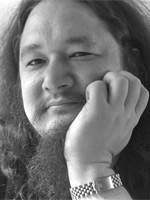
UNM
Dave Ackley is currently an emeritus associate professor of Computer Science at the University of New Mexico, and was previously an External Faculty member at the Santa Fe Institute. Dr. Ackley explores living computation – the principle that living systems and computational systems are ultimately the same things. His research has contributed to neural networks and machine learning, evolutionary algorithms and artificial life, and biological approaches to security, architecture, and models of computation. He is developing robust-first computing on indefinitely scalable computer architectures, moving beyond deterministic execution to expand computational power and achieve a credible basis for computer security.
Dr. Ackley earned his BS in Applied Mathematics from Tufts University, and his MS and PhD in Computer Science from Carnegie Mellon University.
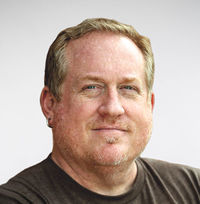
Pacific Light & Hologram
Seamus Blackley, widely known as the “father of the Xbox,” is a high energy physicist and game designer who is currently CEO of venture-backed startup Pacific Light & Hologram.

Infinity Light Science
Tristan Duke is an artist with a background in photography and holography. With a deep interest in the science of optics and visual perception, Tristan seeks to invent new forms of visual representation. His work has been exhibited internationally including: Art Villa Garikula, Georgia; The Velaslavasay Panorama, Los Angeles; MASS MoCA, North Adams; and Holocenter, Long Island, NY. Since 2008 he has been pioneering the development of hand-drawn holography as a creative medium. In 2014, he invented a new holographic technology to create the first ever hand-drawn holographic record for Jack White’s album Lazaretto. He has gone on to create hologram artwork for many records including the Star Wars: The Force Awakens sound track (2016). He is a founding member (along with Lauren Bon and Richard Nielsen) of the Optics Division of the Metabolic Studio. With the Optics Division, exhibitions include: DePaul Art Museum, Chicago, IL; Los Angeles Contemporary Exhibitions (LACE); the Hammer Museum, Los Angeles; Les Rencontres d'Arles, France; The George Eastman House, Rochester, NY; and the Smithsonian Hirshhorn, Washington DC.
Tristan moved his studio, Infinity Light Science, to Los Angeles in 2010. He is a fellow at the Museum of Jurassic Technology.
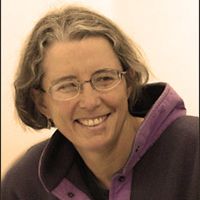
UNM & SFI
Stephanie Forrest is Regents Distinguished Professor of Computer Science at the University of New Mexico in Albuquerque. Professor Forrest received the Ph.D. in Computer and Communication Sciences from the University of Michigan. Before joining UNM she worked for Teknowledge Inc. and was a Director's Fellow at the Center for Nonlinear Studies, Los Alamos National Laboratory. Professor Forrest is currently a member of the External Faculty at the Santa Fe Institute, and served as Co-chair of its Science Board (2010-2013) and as Interim Vice President (1999-2000). She spent 2013-2014 as a Jefferson Science Fellow at the U.S. Dept. of State and is currently a board member of the Computing Research Association. Professor Forrest directs the Adaptive Computation Laboratory at UNM, where she studies adaptive systems, including genetic algorithms, computational immunology, biological modeling, automated software repair, and computer security. She is also a member of the Program in Interdisciplinary Biological & Biomedical Science (PIBBS) and the Center for Evolutionary and Theoretical Immunology (CETI).
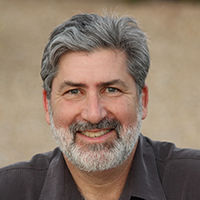
E-Line Media
Alan Gershenfeld has spent the last twenty years at the intersection of entertainment, technology and social entrepreneurship. He is currently President and Co-Founder of E-Line Media, a developer and publisher of games that help players understand and shape the world. Alan has worked on impact game projects with the Gates Foundation, MacArthur Foundation, NSF, USAID, DARPA, White House OSTP, California Endowment, Cook Inlet Tribal Council, Games for Change, Google, Sesame Workshop, MIT Center for Bits and Atoms and the ASU Center for Games and Impact.
Prior to E-Line, Alan was CEO and Co-Founder of netomat, a developer of mobile-web community solutions. Before netomat, Alan was a member of the executive management team that rebuilt Activision from bankruptcy into an industry leader. At Activision, Alan supervised all product development at the company's LA studios. Titles released under his leadership include Civilization: Call to Power, Muppet Treasure Island, Mechwarrior 2, Asteroids 3D, Spycraft, Shanghai, Pitfall, Zork and Tony Hawk Skateboarding.
Before Activision, Alan worked in the film industry where he worked in development, production and post-production on numerous feature films and documentaries. As a writer, Alan was a film critic for the South China Morning Post in Hong Kong and has published articles on video games and social impact in Scientific American, Education Week, Huffington Post, Slate and Knowledge Quest. Most recently Alan co-authored, with his two brothers, Designing Reality: How to Survive and Thrive in the 3rd Digital Revolution.
As a speaker, Alan has been a featured at a wide variety of conferences throughout the world including SXSW, Sundance Film Festival, Game Developers Conference, SOCAP, DICE, Milia/Cannes, AAAS, National Academies and the World Economic Forum at Davos, Switzerland and Dalian, China. Alan currently serves on the Board of FilmAid International and Advisory Boards for PBS Kids New Media, iCivics and the Joan Ganz Cooney Center For Educational Media and Research (Sesame Workshop). He is also on the Advisory Board and former Chairman of Games for Change.

Sproutel
Aaron Horowitz is the co-founder and CEO of Sproutel, which is a patient-centered R&D workshop focused on creating technology at the intersection of patient and market needs. Previous to Sproutel, Aaron was a National Board Advisor at Design for America. Aaron received a BS in Mechanical Engineering from Rice University, and a BS in Mechatronics and User Interaction Design from Northwestern University.

Viewpoints Research Institute & UCLA
Alan Kay was born in Springfield, Massachusetts, in 1940. He received a B.S. in mathematics and molecular biology from the University of Colorado at Boulder (1966) and an M.S. (1968) and Ph.D. (1969) from the University of Utah in Computer Science.
Kay is best known for the idea of personal computing, the concept of the laptop computer, and the inventions of the now ubiquitous overlapping-window interface and modern object-oriented programming.
His deep interest in children was the catalyst for these ideas, and it continues to inspire him. Kay was one of the founders of the Xerox Palo Alto Research Center (PARC), in Palo Alto, California, where he led one of the groups that developed ideas into modern workstations (and the forerunner of the Macintosh), the Smalltalk computer language, the overlapping-window interface, desktop publishing, the Ethernet, laser printing, and network "client servers." His "Dynabook" concept prefigured the modern laptop computer by several decades.
Kay has received many awards, including ACM's Software Systems Award and the J-D Warnier Prix d'Informatique. He is a Fellow of the American Academy of Arts and Sciences, the National Academy of Engineering, and the Royal Society of Arts. He has won the ACM Turing Award (2003) and the Kyoto Prize (2004).
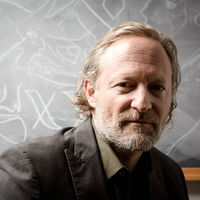
Santa Fe Institute
David Krakauer's research explores the evolution of intelligence on earth. This includes studying the evolution of genetic, neural, linguistic, social and cultural mechanisms supporting memory and information processing, and exploring their shared properties. He served as the founding Director of the Wisconsin Institute for Discovery, the Co-Director of the Center for Complexity and Collective Computation, and Professor of mathematical genetics all at the University of Wisconsin, Madison. David has been a visiting fellow at the Genomics Frontiers Institute at the University of Pennsylvania, a Sage Fellow at the Sage Center for the Study of the Mind at the University of Santa Barbara, a long-term Fellow of the Institute for Advanced Study in Princeton, and visiting Professor of Evolution at Princeton University. In 2012 Dr. Krakauer was included in the Wired Magazine Smart List as one of 50 people "who will change the World.” In 2016 Krakauer was included in Entrepreneur Magazine’s visionary Leaders advancing global research and business.

UC Irvine
Constance Steinkuehler is a Professor of Informatics at the University of California, Irvine where she researches the cognitive and social aspects of esports and multiplayer online videogames. Constance currently chairs the Annual Esports Conference at UCI and the UCI Esports Program Task Force for Diversity and Inclusion. She is the founder and former President of the Higher Education Video Games Alliance and formerly served as Senior Policy Analyst, advising on games and digital media, under the Obama administration in the White House Office of Science and Technology Policy.
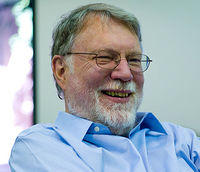
Deloitte Center for the Edge & USC
John Seely Brown or as he is often called—JSB—is the Independent Co-Chairman of the Deloitte’s Center for the Edge and a visiting scholar and advisor to the Provost at University of Southern California (USC). A master integrator and instigator of productive friction, JSB explores the whitespace between disciplines and builds bridges between disparate organizations and ideas.
Prior to that he was the Chief Scientist of Xerox Corporation and the director of its Palo Alto Research Center (PARC)—a position he held until June 2000. In his more than two decades at PARC, Brown transformed the organization into a truly multidisciplinary research center at the creative edge of applied technology and design, integrating social sciences and arts into the traditional physics and computer science research and expanding the role of corporate research to include topics such as the management of radical innovation, organizational learning, complex adaptive systems, and nano-technologies. He was a cofounder of the Institute for Research on Learning (IRL). His personal research interests include digital youth culture, digital media, and the application of technology to fundamentally rethink the nature of work and institutional architectures in order to enable deep learning across organizational boundaries – in brief, to design for emergence in a constantly changing world. JSB is a member of the American Academy of Arts and Sciences, the National Academy of Education, a Fellow of the American Association for Artificial Intelligence and of AAAS and a Trustee of the MacArthur Foundation. He serves on numerous private and public boards of directors, including Amazon, and has been a trustee for nonprofits including the MacArthur Foundation and In-Q-tel. In addition to publishing over 100 papers in scientific journals, JSB has authored numerous articles and reports spanning business strategy and management issues. He was awarded the Harvard Business Review's 1991 McKinsey Award for his article "Research that Reinvents the Corporation" and again in 2002 for his article (with John Hagel) "Your Next IT Strategy." In 1997 he edited the book Seeing Differently: Insights on Innovation (Harvard Business Review Books, 1997) about how new organizational structures, technologies, and global perspectives could change the way innovation occurs. He co-authored (with Paul Duguid) the acclaimed book The Social Life of Information (HBS Press, 2000), which has been translated into 10 languages with a second edition in April 2002. With John Hagel, he co-authored the books The Only Sustainable Edge about new forms of collaborative innovation and The Power of Pull: how small moves, smartly made can set big things in motion, published April 2010. His most recently published book, The New Culture of Learning, co-authored with Doug Thomas at the University of Southern California, was released January 2011. He is currently working on a new book, co-authored with Ann Pendleton-Jullian at Georgetown University called Design Unbound.
JSB received a BA from Brown University in 1962 in mathematics and physics and a PhD from the University of Michigan in 1970 in computer and communication sciences. His eight honorary degrees reflect the breadth and diversity of his leadership, including: May 2000, Brown University, Doctor of Science Degree; July 2001, London Business School, Honorary Doctor of Science in Economics; May 2004, Claremont Graduate University, Honorary Doctor of Humane Letters; May 2005, University of Michigan, Honorary Doctor of Science Degree; May 2009, North Carolina State University, Honorary Doctor of Science Degree; May 2011, Illinois Institute of Technology, Honorary Doctor of Design; July 2013 Singapore Management University, Doctor of Information Systems; May 2014, Bates College, Honorary Doctor of Science; May 2015, Arizona State University, Honorary Doctor of Human Letters. He is an avid reader, traveler and motorcyclist. Part scientist, part artist and part strategist, JSB's views are unique and distinguished by a broad view of the human contexts in which technologies operate and a healthy skepticism about whether or not change always represents genuine progress.

The Baffler
Jacob Silverman is a freelance journalist and occasional book critic. He’s the author of Terms of Service: Social Media and the Price of Constant Connection, published in 2015 by HarperCollins. His work has appeared in the Los Angeles Times, New York Times, The New Republic, The Washington Post, Slate, and many other publications. He’s a contributing editor for The Baffler and often writes about the politics of tech, privacy, surveillance, and media.
In April 2012, Jacob was a three-time Jeopardy champion, an ultimately meaningless distinction (the money’s long spent) that he’s still using to ease his way through uncomfortable parties and tepid personal bios. He lives in New York. He has two cats, an unpublished novel, and a well-honed sense of grievance. His website is www.jacobsilverman.com. He tweets reluctantly, and poorly, as @silvermanjacob.
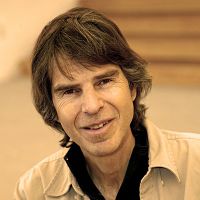
Santa Fe Institute
David Wolpert is an IEEE fellow, is the author of three books and more than 200 papers, has three patents, is an associate editor at more than half a dozen journals, and has received numerous awards. He has more than 17,000 citations in a wide range of fields, including physics, machine learning, game theory, information theory, the therodynamics of computation, and distributed optimization. In particular, his machine learning technique of stacking was instrumental in both winning entries for the Netflix competiton, and his papers on the no free lunch theorems jointly have more than 7,000 citations.
He is a world expert on using nonequilibrium statistical physics to analyze the thermodynamics of computing systems; extending game theory to model humans operating in complex engineered systems; exploiting machine learning to improve optimization; and Monte Carlo methods.
He is currently a member of the resident faculty at the Santa Fe Institute. Previously he was the Ulam Scholar at the Center for Nonlinear Studies at Los Alamos National Laboratory, and before that he was at the NASA Ames Research Center and was a consulting professor at Stanford University, where he formed the Collective Intelligence Group. He has worked at IBM and at a data mining startup, and he is external faculty at numerous international institutions. His degrees in physics are from Princeton University and the University of California.

